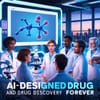Artificial intelligence is revolutionizing the drug discovery process, and a recent breakthrough has brought this technology to the forefront. A British AI system developed by Exscientia has created a new drug molecule that's now in human trials for treating obsessive-compulsive disorder (OCD). This achievement is significant not only because it's the first AI-designed drug to enter human trials but also due to its potential to drastically reduce research and development costs.
The use of AI in drug development has shown impressive results, with the potential to cut down the time it takes to develop a drug from 5 years to just 12 months. Additionally, AI-developed drugs have a higher success rate, with 80-90% passing phase one clinical trials compared to 40-65% of traditionally developed drugs.
Exscientia's AI system has demonstrated the potential of AI in creating effective treatments. Other AI systems, such as AlphaFold, developed by DeepMind, have also made significant contributions to drug discovery by predicting protein structures with high accuracy. This enables researchers to design more targeted therapies.
While AI has shown promise in drug development, its impact on clinical trial success rates remains uncertain. Some industry veterans argue that AI's potential to accelerate drug discovery needs a reality check, citing the 90% failure rate of drugs in clinical trials. Despite these challenges, AI can still help streamline the drug development process and improve efficiency.
As the AI-designed OCD drug moves forward in human trials, it will be crucial to assess the technology's potential to transform the pharmaceutical industry. If successful, this could mark a significant shift in the way drugs are developed, making the process faster, more efficient, and cost-effective


